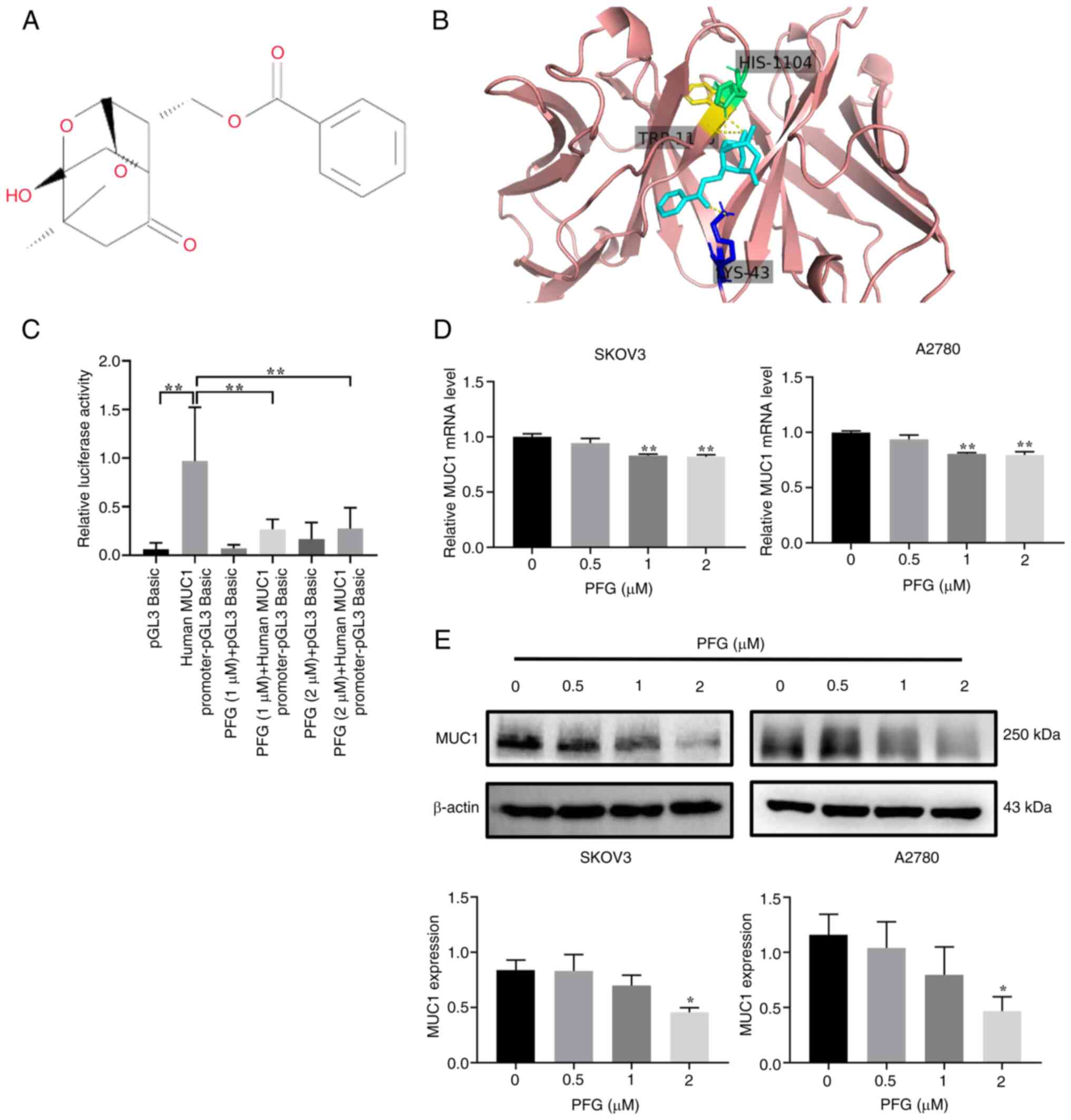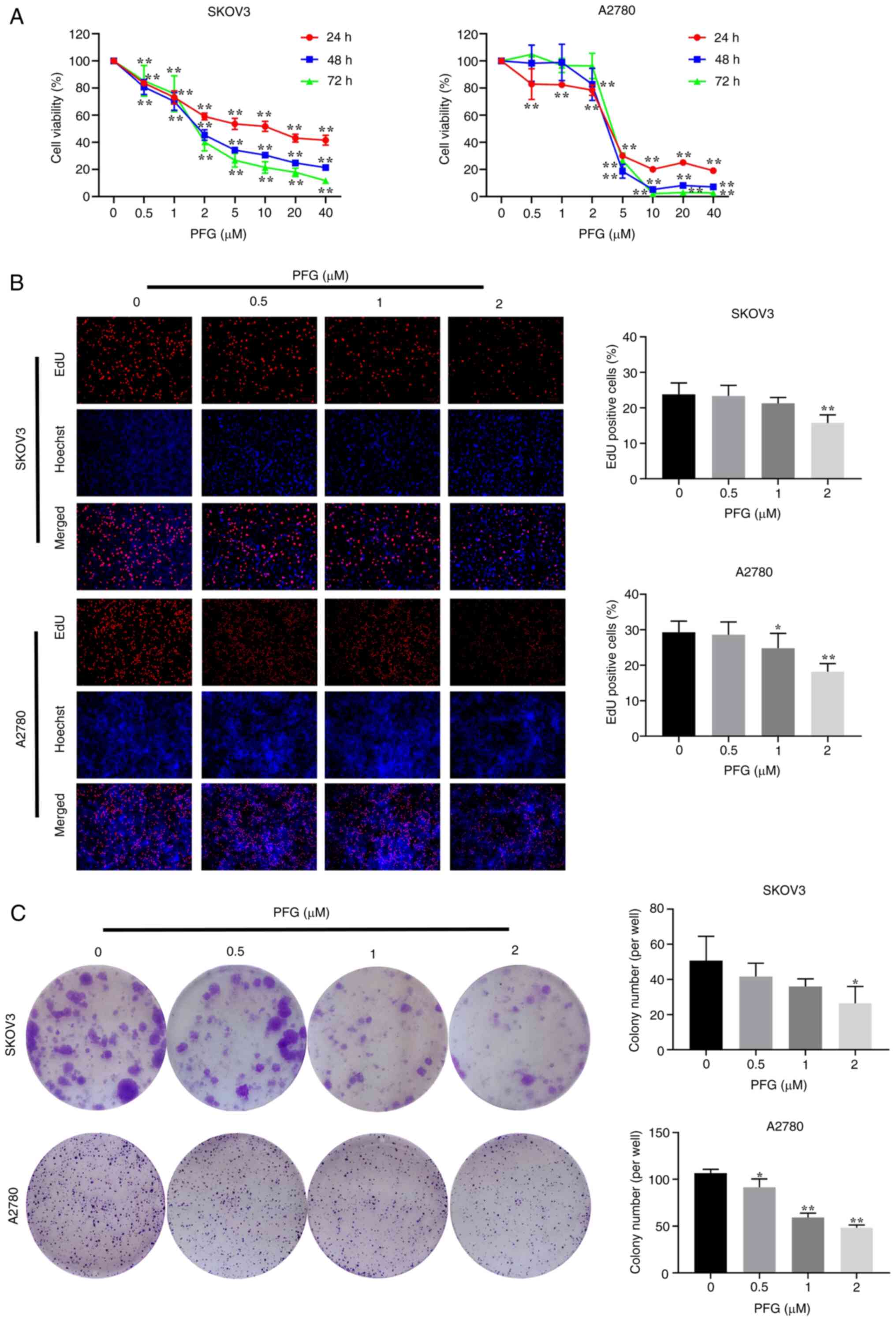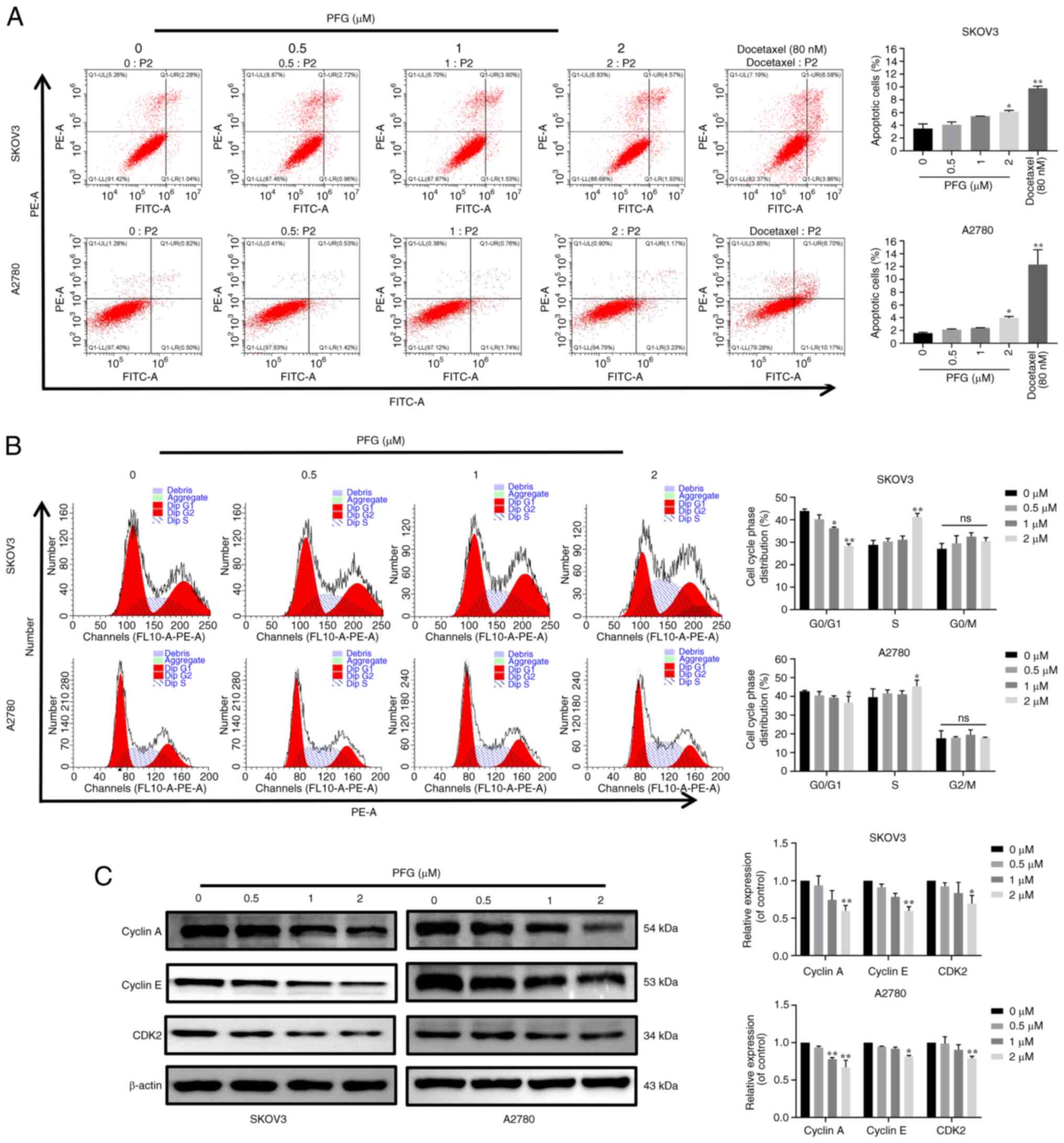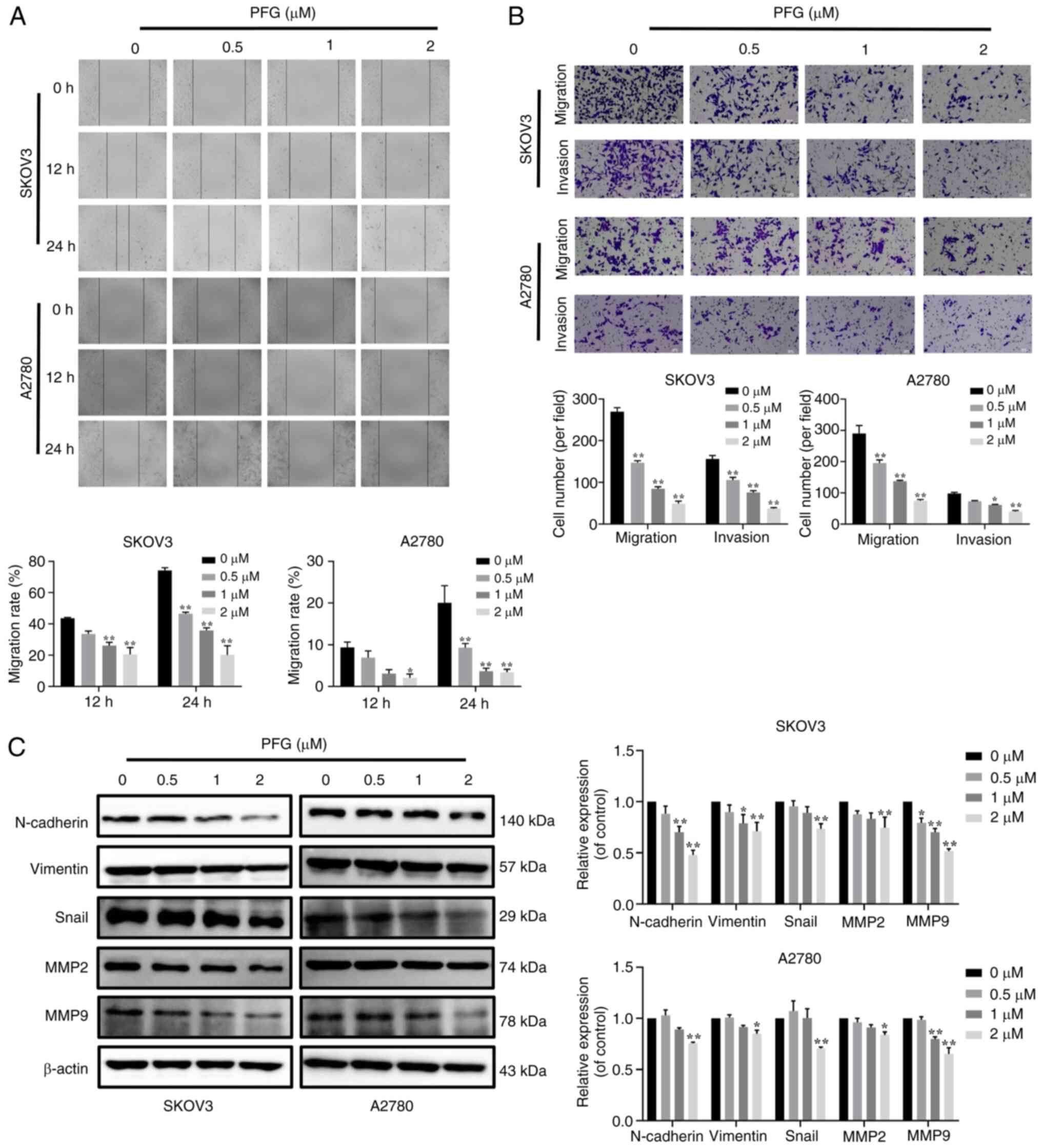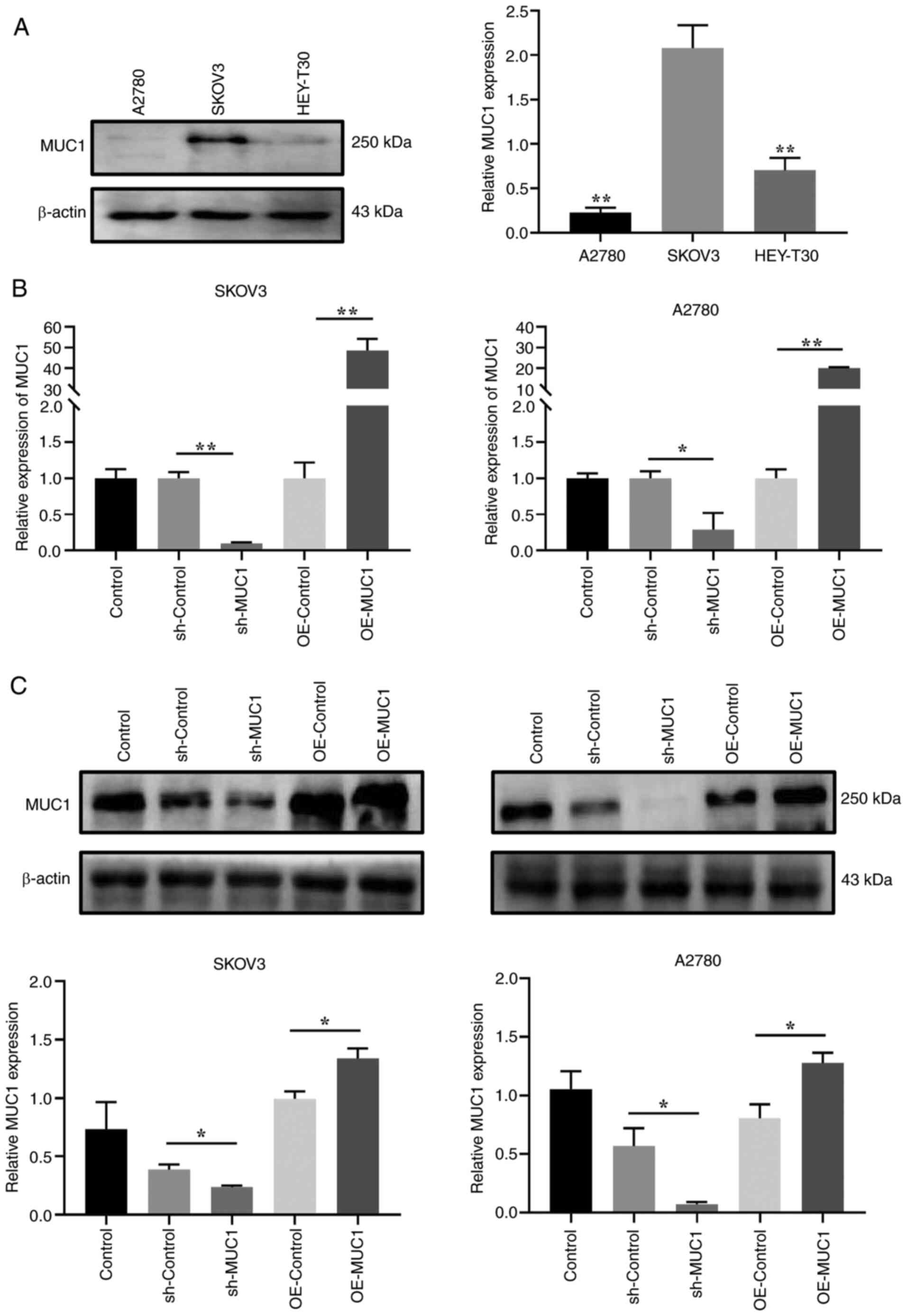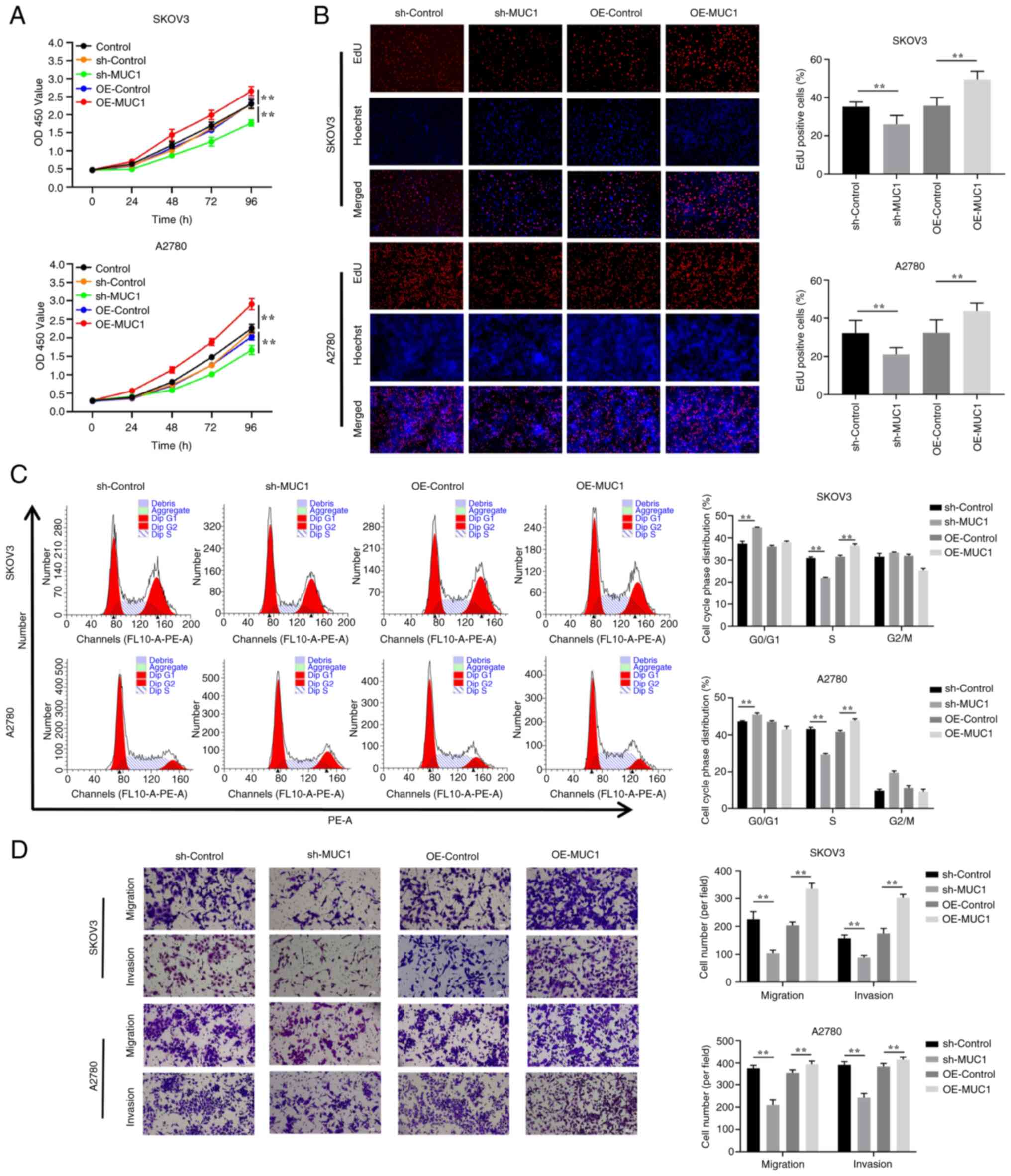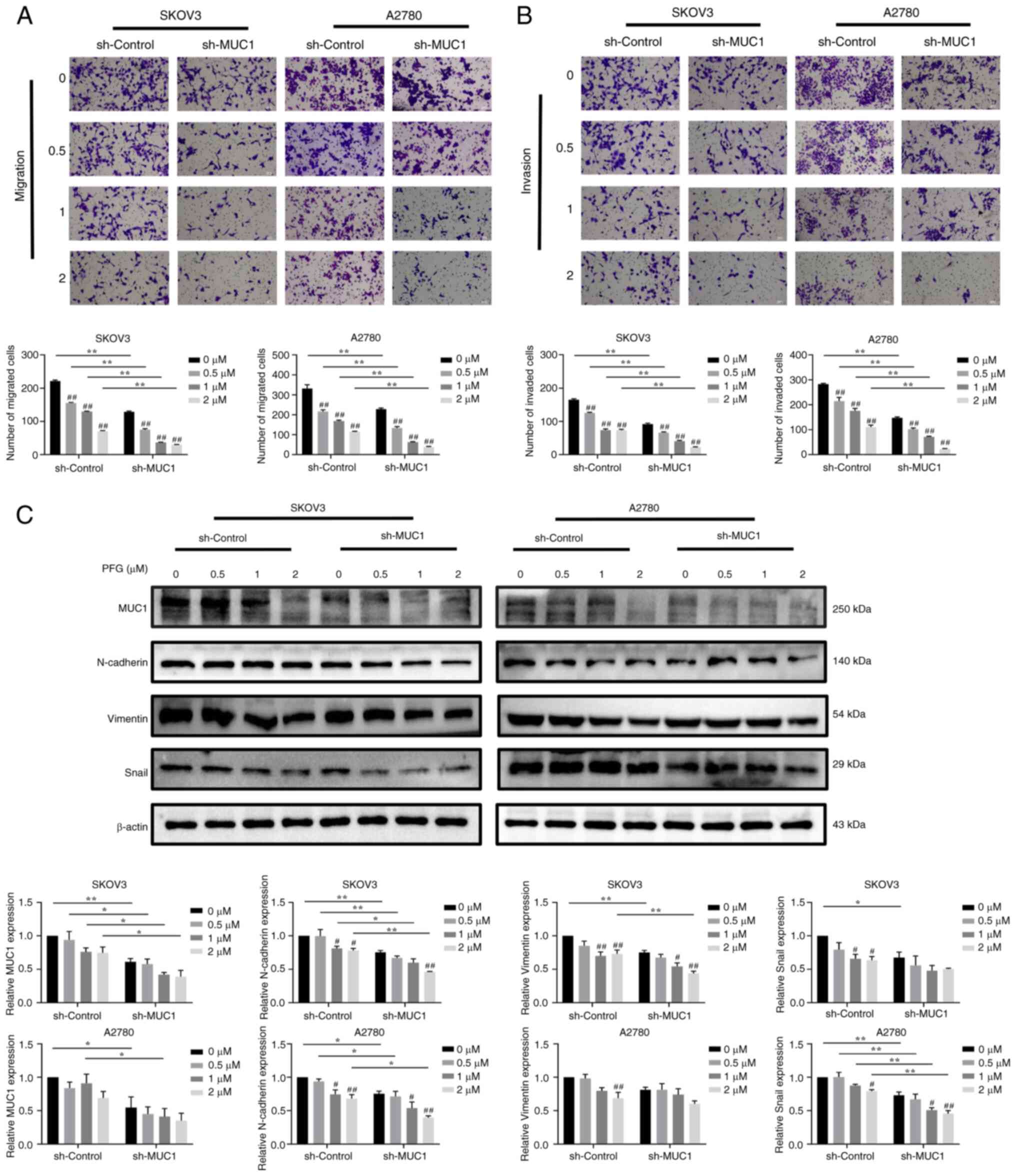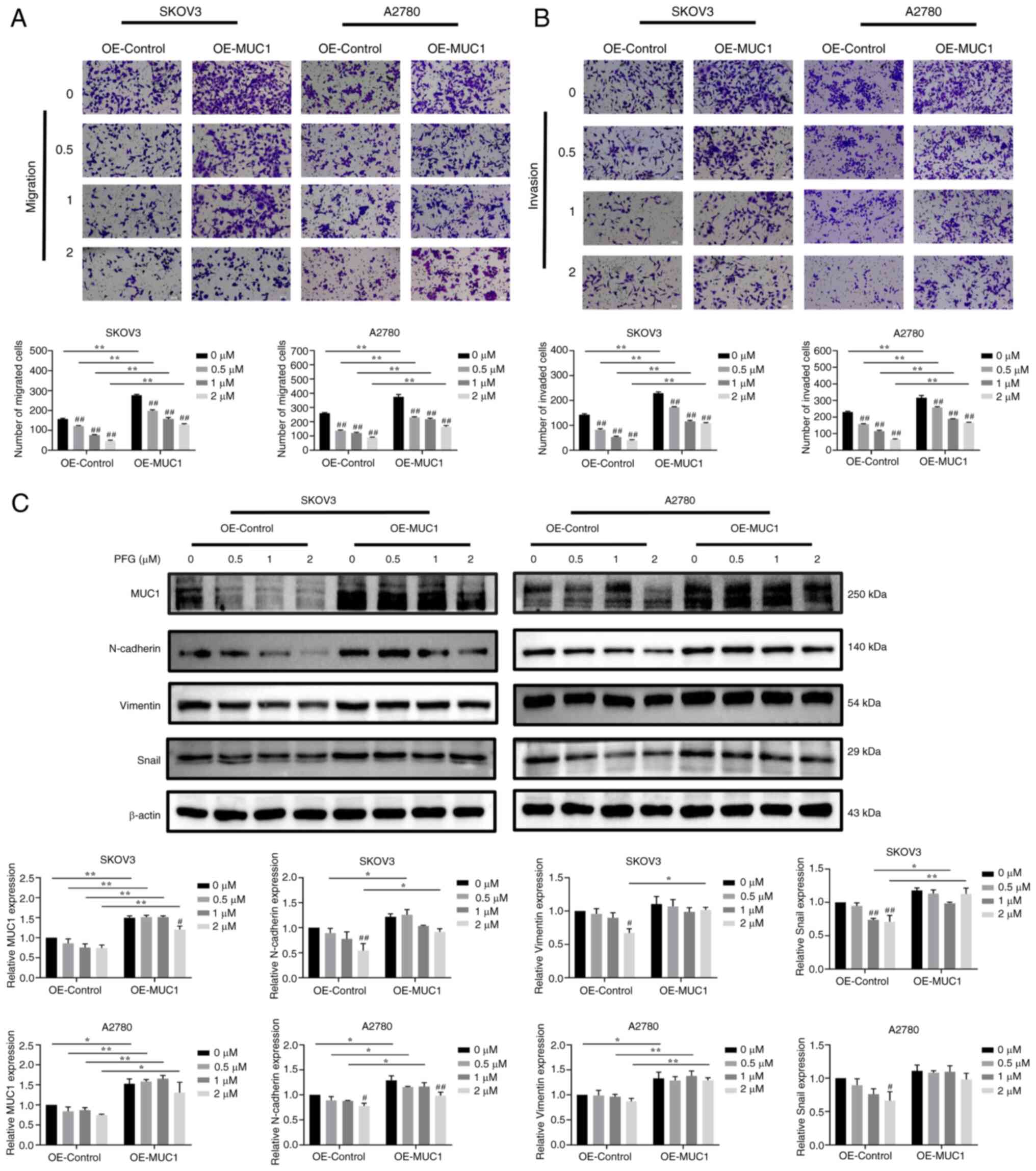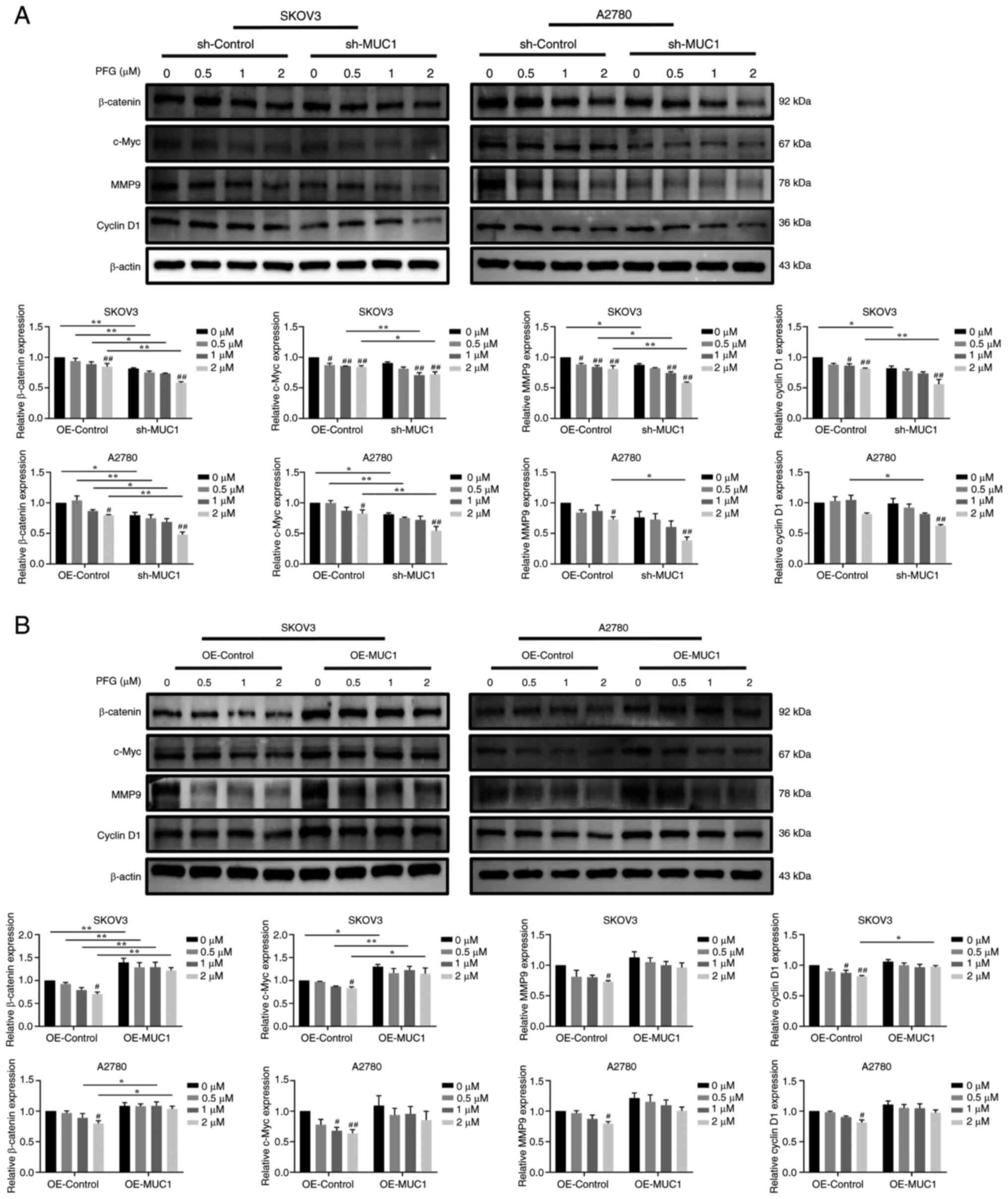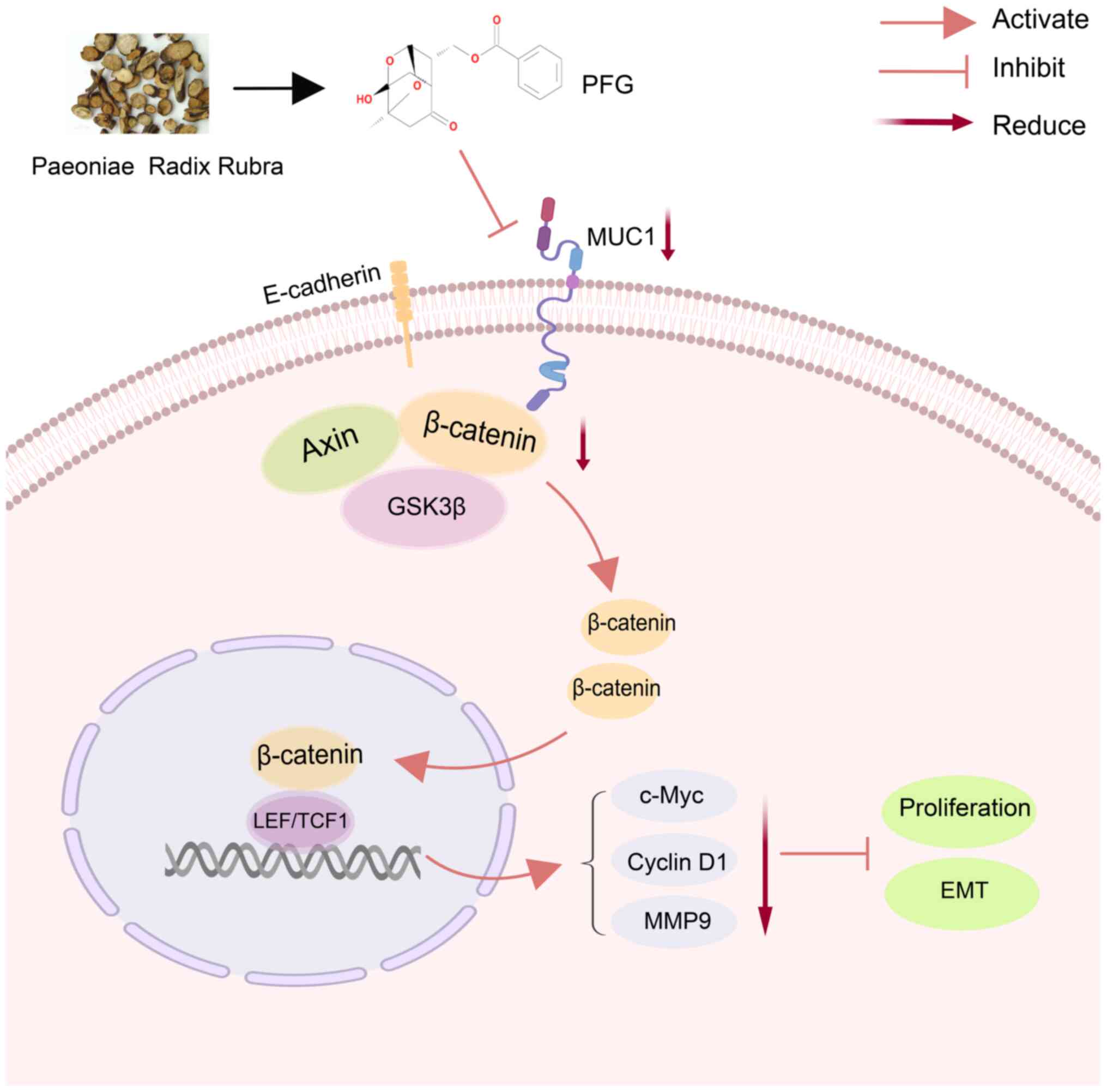|
1
|
Coburn SB, Bray F, Sherman ME and Trabert
B: International patterns and trends in ovarian cancer incidence,
overall and by histologic subtype. Int J Cancer. 140:2451–2460.
2017. View Article : Google Scholar : PubMed/NCBI
|
|
2
|
Torre LA, Bray F, Siegel RL, Ferlay J,
Lortet-Tieulent J and Jemal A: Global cancer statistics, 2012. CA
Cancer J Clin. 65:87–108. 2015. View Article : Google Scholar : PubMed/NCBI
|
|
3
|
Siegel RL, Miller KD, Wagle NS and Jemal
A: Cancer statistics, 2023. CA Cancer J Clin. 73:17–48. 2023.
View Article : Google Scholar : PubMed/NCBI
|
|
4
|
Colombo N, Peiretti M, Parma G, Lapresa M,
Mancari R, Carinelli S, Sessa C and Castiglione M; ESMO Guidelines
Working Group: Newly diagnosed and relapsed epithelial ovarian
carcinoma: ESMO Clinical Practice Guidelines for diagnosis,
treatment and follow-up. Ann Oncol. 21(Suppl 5): v23–v30. 2010.
View Article : Google Scholar : PubMed/NCBI
|
|
5
|
Coleman RL, Monk BJ, Sood AK and Herzog
TJ: Latest research and treatment of advanced-stage epithelial
ovarian cancer. Nat Rev Clin Oncol. 10:211–224. 2013. View Article : Google Scholar : PubMed/NCBI
|
|
6
|
Ediriweera MK, Tennekoon KH and Samarakoon
SR: Role of the PI3K/AKT/mTOR signaling pathway in ovarian cancer:
Biological and therapeutic significance. Semin Cancer Biol.
59:147–160. 2019. View Article : Google Scholar : PubMed/NCBI
|
|
7
|
Christie EL and Bowtell DDL: Acquired
chemotherapy resistance in ovarian cancer. Ann Oncol. 28(suppl_8):
viii13–viii15. 2017. View Article : Google Scholar : PubMed/NCBI
|
|
8
|
Wang Y, Zhang Q, Chen Y, Liang CL, Liu H,
Qiu F and Dai Z: Antitumor effects of immunity-enhancing
traditional Chinese medicine. Biomed Pharmacother. 121:1095702020.
View Article : Google Scholar
|
|
9
|
Sun Z, Su YH and Yue XQ: Professor ling
Changquan's experience in treating primary liver cancer: An
analysis of herbal medication. Zhong Xi Yi Jie He Xue Bao.
6:1221–1225. 2008.In Chinese. View Article : Google Scholar : PubMed/NCBI
|
|
10
|
Tian AP, Yin YK, Yu L, Yang BY, Li N, Li
JY, Bian ZM, Hu SY, Weng CX and Feng L: Low-Frequency sonophoresis
of chinese medicine formula improves efficacy of malignant pleural
effusion treatment. Chin J Integr Med. 26:263–269. 2020. View Article : Google Scholar
|
|
11
|
Gao J, Yang J, Lu Z, Dong X and Xu Y: The
Multiple pharmacologic functions and mechanisms of action of guizhi
fuling formulation. Evid Based Complement Alternat Med.
2022:68134212022. View Article : Google Scholar : PubMed/NCBI
|
|
12
|
Yang J, Ren Y, Lou ZG, Wan X, Weng GB and
Cen D: Paeoniflorin inhibits the growth of bladder carcinoma via
deactivation of STAT3. Acta Pharm. 68:211–222. 2018. View Article : Google Scholar : PubMed/NCBI
|
|
13
|
Liu H, Zang L, Zhao J, Wang Z and Li L:
Paeoniflorin inhibits cell viability and invasion of liver cancer
cells via inhibition of Skp2. Oncol Lett. 19:3165–3172.
2020.PubMed/NCBI
|
|
14
|
Zheng YB, Xiao GC, Tong SL, Ding Y, Wang
QS, Li SB and Hao ZN: Paeoniflorin inhibits human gastric carcinoma
cell proliferation through up-regulation of microRNA-124 and
suppression of PI3K/Akt and STAT3 signaling. World J Gastroenterol.
21:7197–7207. 2015. View Article : Google Scholar : PubMed/NCBI
|
|
15
|
Wang Y, Wang Q, Li X, Luo G, Shen M, Shi
J, Wang X and Tang L: Paeoniflorin Sensitizes breast cancer cells
to tamoxifen by Downregulating microRNA-15b via the
FOXO1/CCND1/β-Catenin axis. Drug Des Devel Ther. 15:245–257. 2021.
View Article : Google Scholar :
|
|
16
|
Gao J, Song L, Xia H, Peng L and Wen Z:
6'-O-galloylpaeoniflorin regulates proliferation and metastasis of
non-small cell lung cancer through AMPK/miR-299-5p/ATF2 axis.
Respir Res. 21:392020. View Article : Google Scholar : PubMed/NCBI
|
|
17
|
Wang XZ, Xia L, Zhang XY, Chen Q, Li X,
Mou Y, Wang T and Zhang YN: The multifaceted mechanisms of
Paeoniflorin in the treatment of tumors: State-of-the-Art. Biomed
Pharmacother. 149:1128002022. View Article : Google Scholar : PubMed/NCBI
|
|
18
|
Kimura M, Kimura I, Nojima H, Takahashi K,
Hayashi T, Shimizu M and Morita N: Blocking effects of a new
component, paeoniflorigenone, in paeony root on neuromuscular
junctions of frogs and mice. Jpn J Pharmacol. 35:61–66. 1984.
View Article : Google Scholar : PubMed/NCBI
|
|
19
|
Koo YK, Kim JM, Koo JY, Kang SS, Bae K,
Kim YS, Chung JH and Yun-Choi HS: Platelet anti-aggregatory and
blood anti-coagulant effects of compounds isolated from Paeonia
lactiflora and Paeonia suffruticosa. Pharmazie. 65:624–628.
2010.PubMed/NCBI
|
|
20
|
Huang Y, Ohno O, Suenaga K and Miyamoto K:
Apoptosis-inducing activity and antiproliferative effect of
Paeoniflorigenone from moutan cortex. Biosci Biotechnol Biochem.
81:1106–1113. 2017. View Article : Google Scholar : PubMed/NCBI
|
|
21
|
Huang Y, Ohno O and Miyamoto K: PFG acted
as an inducer of premature senescence in TIG-1 normal diploid
fibroblast and an inhibitor of mitosis in the HeLa cells. Biosci
Biotechnol Biochem. 83:986–995. 2019. View Article : Google Scholar : PubMed/NCBI
|
|
22
|
Hu XF, Yang E, Li J and Xing PX: MUC1
cytoplasmic tail: A potential therapeutic target for ovarian
carcinoma. Expert Rev Anticancer Ther. 6:1261–1271. 2006.
View Article : Google Scholar : PubMed/NCBI
|
|
23
|
Van Elssen CH, Frings PW, Bot FJ, Van de
Vijver KK, Huls MB, Meek B, Hupperets P, Germeraad WT and Bos GM:
Expression of aberrantly glycosylated Mucin-1 in ovarian cancer.
Histopathology. 57:597–606. 2010. View Article : Google Scholar : PubMed/NCBI
|
|
24
|
Gendler SJ: MUC1, the renaissance
molecule. J Mammary Gland Biol Neoplasia. 6:339–353. 2001.
View Article : Google Scholar : PubMed/NCBI
|
|
25
|
Nath S and Mukherjee P: MUC1: A
multifaceted oncoprotein with a key role in cancer progression.
Trends Mol Med. 20:332–342. 2014. View Article : Google Scholar : PubMed/NCBI
|
|
26
|
Chen W, Zhang Z, Zhang S, Zhu P, Ko JK and
Yung KK: MUC1: Structure, function, and clinic application in
epithelial cancers. Int J Mol Sci. 22:65672021. View Article : Google Scholar : PubMed/NCBI
|
|
27
|
Mommers EC, Leonhart AM, von
Mensdorff-Pouilly S, Schol DJ, Hilgers J, Meijer CJ, Baak JP and
van Diest PJ: Aberrant expression of MUC1 mucin in ductal
hyperplasia and ductal carcinoma In situ of the breast. Int J
Cancer. 84:466–469. 1999. View Article : Google Scholar : PubMed/NCBI
|
|
28
|
Gaemers IC, Vos HL, Volders HH, van der
Valk SW and Hilkens J: A stat-responsive element in the promoter of
the episialin/MUC1 gene is involved in its overexpression in
carcinoma cells. J Biol Chem. 276:6191–6199. 2001. View Article : Google Scholar
|
|
29
|
Wesseling J, van der Valk SW, Vos HL,
Sonnenberg A and Hilkens J: Episialin (MUC1) overexpression
inhibits integrin-mediated cell adhesion to extracellular matrix
components. J Cell Biol. 129:255–265. 1995. View Article : Google Scholar : PubMed/NCBI
|
|
30
|
Feng H, Ghazizadeh M, Konishi H and Araki
T: Expression of MUC1 and MUC2 mucin gene products in human ovarian
carcinomas. Jpn J Clin Oncol. 32:525–529. 2002. View Article : Google Scholar
|
|
31
|
Mohr AM, Bailey JM, Lewallen ME, Liu X,
Radhakrishnan P, Yu F, Tapprich W and Hollingsworth MA: MUC1
regulates expression of multiple microRNAs involved in pancreatic
tumor progression, including the miR-200c/141 cluster. PLoS One.
8:e733062013. View Article : Google Scholar : PubMed/NCBI
|
|
32
|
Rajabi H, Alam M, Takahashi H, Kharbanda
A, Guha M, Ahmad R and Kufe D: MUC1-C oncoprotein activates the
ZEB1/miR-200c regulatory loop and epithelial-mesenchymal
transition. Oncogene. 33:1680–1689. 2014. View Article : Google Scholar
|
|
33
|
Seeliger D and de Groot BL: Ligand docking
and binding site analysis with PyMOL and Autodock/Vina. J Comput
Aided Mol Des. 24:417–422. 2010. View Article : Google Scholar : PubMed/NCBI
|
|
34
|
Livak KJ and Schmittgen TD: Analysis of
relative gene expression data using real-time quantitative PCR and
the 2(-Delta Delta C(T)) method. Methods. 25:402–408. 2001.
View Article : Google Scholar
|
|
35
|
Gardner AB, Charo LM, Mann AK, Kapp DS,
Eskander RN and Chan JK: Ovarian, uterine, and cervical cancer
patients with distant metastases at diagnosis: Most common
locations and outcomes. Clin Exp Metastasis. 37:107–113. 2020.
View Article : Google Scholar
|
|
36
|
Zhao H, Ming T, Tang S, Ren S, Yang H, Liu
M, Tao Q and Xu H: Wnt signaling in colorectal cancer: Pathogenic
role and therapeutic target. Mol Cancer. 21:1442022. View Article : Google Scholar : PubMed/NCBI
|
|
37
|
Park KR, Lee H, Kim SH and Yun HM:
Paeoniflorigenone regulates apoptosis, autophagy, and necroptosis
to induce anti-cancer bioactivities in human head and neck squamous
cell carcinomas. J Ethnopharmacol. 288:1150002022. View Article : Google Scholar : PubMed/NCBI
|
|
38
|
Wang L, Ma J, Liu F, Yu Q, Chu G, Perkins
AC and Li Y: Expression of MUC1 in primary and metastatic human
epithelial ovarian cancer and its therapeutic significance. Gynecol
Oncol. 105:695–702. 2007. View Article : Google Scholar : PubMed/NCBI
|
|
39
|
Deng J, Wang L, Chen H, Li L, Ma Y, Ni J
and Li Y: The role of tumour-associated MUC1 in epithelial ovarian
cancer metastasis and progression. Cancer Metastasis Rev.
32:535–551. 2013. View Article : Google Scholar : PubMed/NCBI
|
|
40
|
Ma Q, Song J, Wang S and He N: MUC1
regulates AKT signaling pathway by upregulating EGFR expression in
ovarian cancer cells. Pathol Res Pract. 224:1535092021. View Article : Google Scholar : PubMed/NCBI
|
|
41
|
Oei AL, Moreno M, Verheijen RH, Sweep FC,
Thomas CM, Massuger LF and von Mensdorff-Pouilly S: Induction of
IgG antibodies to MUC1 and survival in patients with epithelial
ovarian cancer. Int J Cancer. 123:1848–1853. 2008. View Article : Google Scholar : PubMed/NCBI
|
|
42
|
Wang L, Chen H, Liu F, Madigan MC, Power
CA, Hao J, Patterson KI, Pourgholami MH, O'Brien PM, Perkins AC and
Li Y: Monoclonal antibody targeting MUC1 and increasing sensitivity
to docetaxel as a novel strategy in treating human epithelial
ovarian cancer. Cancer Lett. 300:122–133. 2011. View Article : Google Scholar
|
|
43
|
Wang L, Chen H, Pourgholami MH, Beretov J,
Hao J, Chao H, Perkins AC, Kearsley JH and Li Y: Anti-MUC1
monoclonal antibody (C595) and docetaxel markedly reduce tumor
burden and ascites, and prolong survival in an in vivo ovarian
cancer model. PLoS One. 6:e244052011. View Article : Google Scholar : PubMed/NCBI
|
|
44
|
Mohebtash M, Tsang KY, Madan RA, Huen NY,
Poole DJ, Jochems C, Jones J, Ferrara T, Heery CR, Arlen PM, et al:
A pilot study of MUC-1/CEA/TRICOM poxviral-based vaccine in
patients with metastatic breast and ovarian cancer. Clin Cancer
Res. 17:7164–7173. 2011. View Article : Google Scholar : PubMed/NCBI
|
|
45
|
Morse MA, Niedzwiecki D, Marshall JL,
Garrett C, Chang DZ, Aklilu M, Crocenzi TS, Cole DJ, Dessureault S,
Hobeika AC, et al: A randomized phase II study of immunization with
dendritic cells modified with poxvectors encoding CEA and MUC1
compared with the same poxvectors plus GM-CSF for resected
metastatic colorectal cancer. Ann Surg. 258:879–886. 2013.
View Article : Google Scholar : PubMed/NCBI
|
|
46
|
Gatti-Mays ME, Strauss J, Donahue RN,
Palena C, Del Rivero J, Redman JM, Madan RA, Marté JL, Cordes LM,
Lamping E, et al: A phase I Dose-escalation trial of BN-CV301, a
recombinant poxviral vaccine targeting MUC1 and CEA with
costimulatory molecules. Clin Cancer Res. 25:4933–4944. 2019.
View Article : Google Scholar : PubMed/NCBI
|
|
47
|
Tsuchiya K, Kiyoshi M, Hashii N, Fujita M,
Kurohara T, Ishii-Watabe A, Fukuhara K, Misawa T and Demizu Y:
Development of a penetratin-conjugated stapled peptide that
inhibits Wnt/β-catenin signaling. Bioorg Med Chem. 73:1170212022.
View Article : Google Scholar
|
|
48
|
Zhang Y and Wang X: Targeting the
Wnt/β-catenin signaling pathway in cancer. J Hematol Oncol.
13:1652020. View Article : Google Scholar
|
|
49
|
Liu J, Xiao Q, Xiao J, Niu C, Li Y, Zhang
X, Zhou Z, Shu G and Yin G: Wnt/β-catenin signalling: Function,
biological mechanisms, and therapeutic opportunities. Signal
Transduct Target Ther. 7:32022. View Article : Google Scholar
|
|
50
|
Song F, Chen FY, Wu SY, Hu B, Liang XL,
Yang HQ, Cheng JW, Wang PX, Guo W, Zhou J, et al: Mucin 1 promotes
tumor progression through activating WNT/β-catenin signaling
pathway in intrahepatic cholangiocarcinoma. J Cancer. 12:6937–6947.
2021. View Article : Google Scholar :
|
|
51
|
Liu X, Caffrey TC, Steele MM, Mohr A,
Singh PK, Radhakrishnan P, Kelly DL, Wen Y and Hollingsworth MA:
MUC1 regulates cyclin D1 gene expression through p120 catenin and
β-catenin. Oncogenesis. 3:e1072014. View Article : Google Scholar
|
|
52
|
Wang Z, Sun J, Hu X and Huang S:
Interference of mucin 1 inhibits progression of colon carcinoma by
repression of Wnt/β-catenin signaling. DNA Cell Biol. 33:162–170.
2014. View Article : Google Scholar : PubMed/NCBI
|















